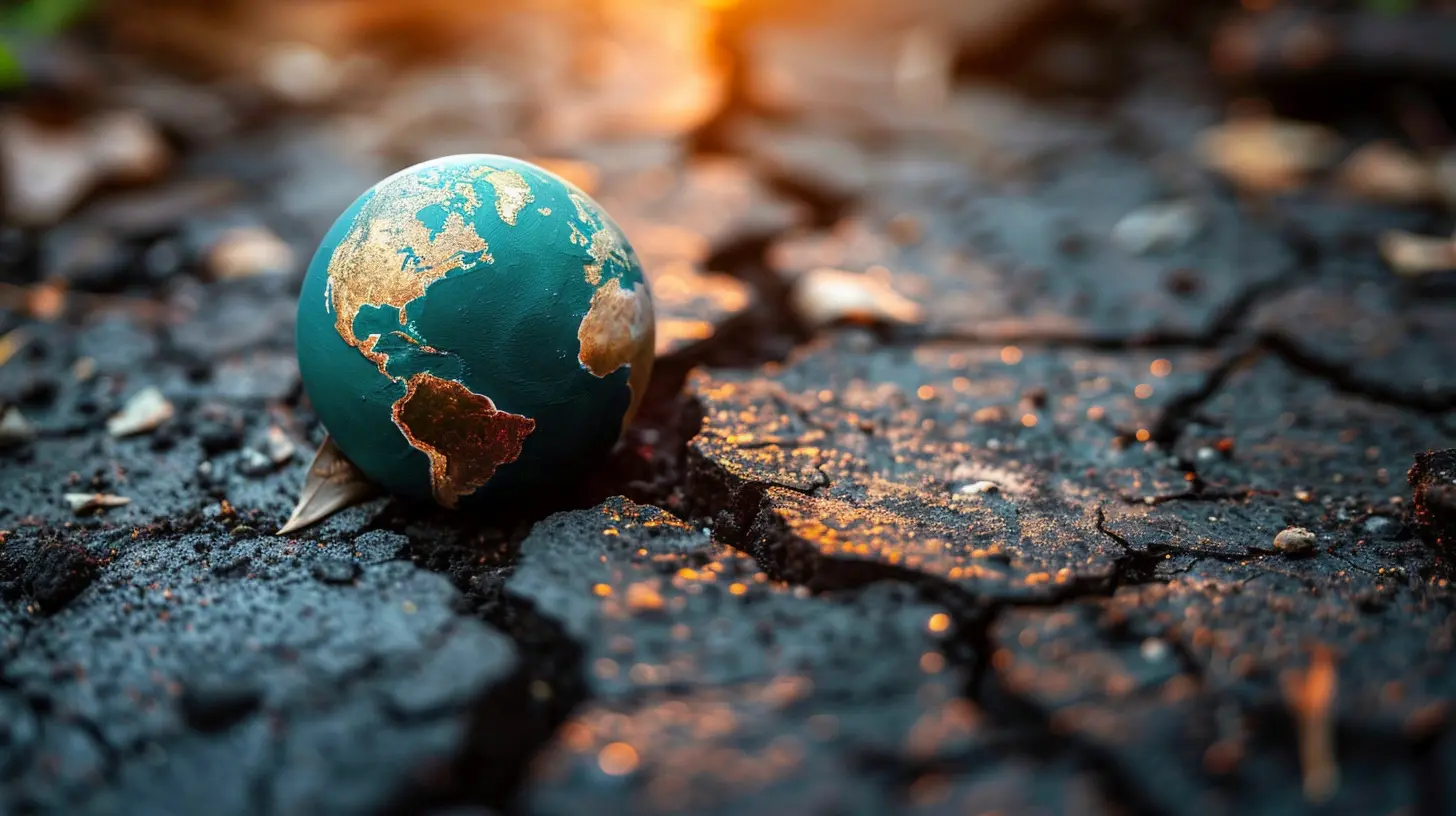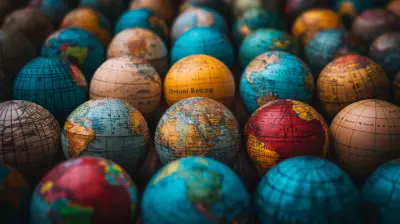The Impact of Financial Crises on Emerging Markets
21 July 2025
Let’s be real — talking about financial crises isn’t exactly like discussing your favorite Netflix docuseries. But hold on! Before your eyes glaze over and you start daydreaming about your next vacation, let me promise you something: this article is going to unravel the awe-inspiring chaos of global finance in a way that’s fun, funny, and totally understandable.
So, buckle up. We're diving into the wild world of money meltdowns and how they mess with the economies that are still trying to find their financial footing — the so-called “emerging markets.”
First Things First: What the Heck Is a Financial Crisis?
Imagine if banks were people. A financial crisis is basically a giant, unsupervised frat party that ends with banks passed out on the floor, stock markets crying in the bathroom, and credit markets ghosting everyone. It's when financial institutions stop functioning normally — lending slows, investments freeze, and everyone holds onto their cash like it's the last cookie in the jar.Now, sprinkle that disaster over countries like Brazil, India, South Africa, or Thailand — nations still building their financial muscles — and you’ve got a recipe for economic hangovers that can last for years. Ouch.
What Counts as an “Emerging Market”?
Good question. Think of emerging markets as the awkward teenagers of the global economy. Not quite mature like the U.S., Japan, or Germany, but not toddlers either. They're growing fast (hormones, anyone?), full of potential, and occasionally prone to dramatic mood swings.These are countries that are transitioning from developing to developed. They're often blessed with natural resources, young populations, and TikTok-level economic growth rates — but they're also vulnerable to shocks.
So, How Does a Financial Crisis Actually Hit These Markets?
Picture a giant financial sneeze in the U.S. Guess what? Emerging markets might catch pneumonia.Seriously. When a big economy goes into crisis mode, like the 2008 global financial dumpster fire, it sends shockwaves around the world. And emerging markets? They’re standing way too close to the epicenter without an umbrella.
Let’s break it down.
1. Investors Panic and Pull Out Fast
You ever try Jenga? Pull out one wrong block, and the whole tower topples. During a financial crisis, international investors — the folks who throw money into promising emerging markets — yank their cash out faster than you can say “stock portfolio.”Why? Because investors love a good scare. The moment they smell risk, they retreat to their comfort zones (read: gold, U.S. dollar, and Netflix subscriptions).
For emerging markets, this sudden withdrawal of capital is like pulling the oxygen out of the room.
2. Currency Nosedives Harder Than a Budget Airline
When investors take their money and run, the local currency often plunges. It's like your money just went on a diet... but not the good kind.A weaker currency means imports cost more, debt payments skyrocket (especially if they’re in U.S. dollars), and inflation goes "Hey there, I'm back!" Suddenly, buying bread feels like ordering truffle toast at a five-star restaurant.
3. Debt Becomes a Monster Hiding in the Closet
Emerging markets often rely on foreign debt to build things like roads, bridges, and social programs. But if that debt is in U.S. dollars and the local currency crashes, those payments balloon like your pants after Thanksgiving dinner.Servicing debt becomes harder. Governments cut spending. Growth slows. It's like a very depressing domino effect.
Real-Life Plot Twists: Case Studies You’ll Actually Want to Read
Okay, story time! Let’s look at a few juicy, real-world examples of how financial crises wreak havoc on emerging markets.🐈 The 1997 Asian Financial Crisis – AKA The Domino Catastrophe
Thailand decided to float its currency, the baht, and within weeks the whole region was falling like a stack of pancakes on a balance beam. Indonesia, South Korea, and Malaysia were hit hard. Stock markets tanked. Banks collapsed. Protests erupted. Basically, it was the economic equivalent of a soap opera plot twist.🛢️ The 2014 Oil Price Crash – Oil Gets Cheap, Economies Get Broke
When oil prices dropped faster than a phone from your back pocket, oil-dependent countries like Nigeria and Venezuela were left clutching empty wallets. Their budgets — heavily reliant on oil exports — were shattered. Inflation partied hard, and job losses piled up like unwashed laundry.💸 The 2008 Global Financial Crisis – America Sneezes, Everyone Else Dies
Thanks, Wall Street! The housing bubble burst, Lehman Brothers collapsed, and suddenly emerging economies faced credit freezes and slumping exports. Countries like Brazil saw their GDPs contract, capital outflows surged, and currencies slid down the banana peel of doom.But Wait… Isn’t There a Bright Side?
Believe it or not, yes! Crises — like bad haircuts — eventually grow out. And sometimes, they force emerging markets to get their act together.🔧 Policy Reforms Get a Much-Needed Kickstart
Nothing motivates a government to fix its economy like angry citizens and drained coffers. Crises often lead to reforms: better regulations, stronger banks, and smarter fiscal policies.It’s the economic version of “doing squats after eating too many donuts.”
🧠 Lessons Learned (Hopefully)
Remember when you touched a hot stove as a kid and never did it again? Emerging markets learn from past crises — building up reserves, reducing foreign debt, and controlling inflation better the next time around. (Well, most of the time.)🌱 Long-Term Growth Often Bounces Back
Economies are surprisingly like rubber balls (well, the resilient ones). After they hit the pavement, the bounce back can be strong. New industries emerge. Foreign investors return. Consumers start spending again. It’s like a comeback tour — but hopefully with fewer pyrotechnics.So, Is Anyone (Ever) Prepared?
Let’s not kid ourselves. Predicting financial crises is about as easy as herding cats. But emerging markets can — and do — build some defenses.🛡️ Foreign Reserves: The Emergency Pizza Fund
Countries stack up foreign reserves to cushion the blow. Think of it like an emergency stash of cash you keep so you don’t starve in between paychecks — except it's in billions.💵 Diversified Economies
Relying on just one or two industries is like only eating pizza because it’s your favorite food. Sooner or later, it’ll catch up with you. Diversification helps smooth out the bumps when one sector takes a hit.👀 Strong Institutions and Regulations
Solid financial systems, transparent policies, and competent central banks make a huge difference. You want adults in the room when the economy throws a tantrum, not toddlers with calculators.Quick Recap: Because TL;DR Is a Thing
- Financial crises = economic chaos that spreads faster than gossip.- Emerging markets get hit hard thanks to capital flight, weak currencies, and scary debt.
- Past crises show us the good, bad, and very ugly.
- There is hope — reforms, resilience, and rebounds happen.
- Preparation is key: think reserves, regulation, and not putting all eggs in one (oil-laden) basket.
Final Thoughts: Crises May Be Inevitable, Panic Isn’t
Look, financial crises are like your obnoxious uncle who shows up uninvited to every party. You can’t always stop him from coming, but you can be ready when he shows up.Emerging markets have come a long way. Sure, they still face risks — heck, everyone does. But with the right tools, policies, and a bit of economic duct tape, these growing economies can weather the storm and come out swaggering on the other side.
So next time you hear some scary headline about a currency crash in X-land or a stock market nosedive in Y-stan, just remember: economies are tougher than they look.
And don’t worry, your bank account will be fine — unless you spent it all on crypto and avocado toast. In which case… well, good luck.
all images in this post were generated using AI tools
Category:
Financial CrisisAuthor:

Uther Graham
Discussion
rate this article
1 comments
April Strickland
This article raises intriguing questions about the resilience of emerging markets during financial crises. How do these economies adapt and what strategies have proven most effective in mitigating long-term damage? I'd love to learn more!
August 6, 2025 at 3:26 AM

Uther Graham
Thank you for your interest! Emerging markets often adapt by diversifying their economies, strengthening regulatory frameworks, and enhancing social safety nets. Strategies like improving access to financial services and fostering regional cooperation have also proven effective in mitigating long-term damage. I appreciate your curiosity and would be happy to explore these topics further!


